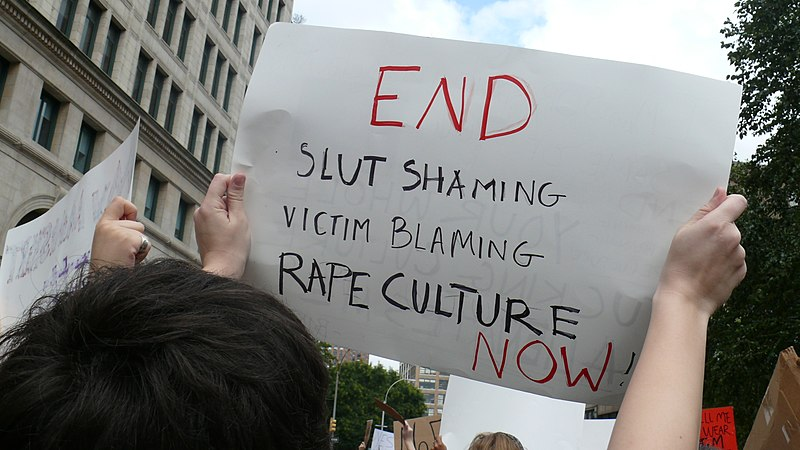The childhood tradition of trick-or-treating with friends while donning the adorable costumes our parents loved suddenly changes as we enter our teenage years. That’s when Halloween morphs into a spectacle seemingly plucked from the scenes of the coming-of-age film “Mean Girls,” in which the titular characters don skimpy lingerie paired with animal ears and call it a day.
The days of homemade “Little Mermaid” tails have been replaced by fishnet stockings. Whimsical white rabbits are replaced by sexy Playboy Bunnies. Although this change seems drastic, it represents the most consistent and ageless part of Halloween that should never be discouraged: dressing up as some latent side of ourselves.
These dormant interests and tastes change as we mature, so it only makes sense for women’s costumes to follow the same pattern. Many kids want to use their costumes as vessels to communicate their interest in movies and cartoons. For some adult women, however, Halloween is a day that is reserved to reflect their right to feel confident. I too have gone through this change.
In the past, I’ve dressed as movie characters like Hermione Granger and Lydia Deetz. Recently, however, I’ve chosen more revealing costumes, wanting badly to feel confident in my own skin even as I pretend to be someone else. This is the essence of wearing a costume. Simply celebrating Halloween as it is meant to be celebrated should never be a green light for people to slut-shame or harass women.
According to the National Library of Medicine, 50% of girls are slut-shamed versus 20% of boys. Psychologists have found that slut-shaming during a child’s formative period, such as adolescence, can affect identity development. This is a time when the gender aspect of self-concept is developed by using social cues to determine what it is to be a girl or a boy. For young girls, seeing themselves and other women constantly shamed for expressing confidence through clothing may cause them to internalize a sense of insecurity that remains into adulthood.
Due to this, many women, including myself, go through daily life feeling unsure about how they look or what other people think of them. Halloween is a respite during the year for girls to shed this insecurity by becoming someone new. However, this is only half of the narrative.
While some women dress in sexier costumes to break free from societal confines for a day, others are influenced to do so by the holiday market. The phrase “sex sells” is increasingly apparent as modern retailers capitalize on sexualizing costumes from witches to nuns.
It would seem, in this sense, that dressing promiscuously on Halloween is encouraged, but in the midst of the celebration people talk, people gossip and people bully.
“At a Halloween party last week, there was a girl walking by another group of girls, and she wasn’t dressed any more revealing than they were, but they were giving her dirty looks,” said Ziva Garcia, an ECG junior. “One of the girls looked at her and said ‘cover up.’”
These comments, especially from other women, are disheartening and confusing for many women considering they are merely participating in Halloween traditions they were seemingly encouraged to partake in.
What makes it worse is that these comments play into one of the most dangerous and pervasive parts of rape culture in America: victim blaming. According to a survey by The Independent, 41% of women and 55% of men think scantily dressed women are more likely to be harassed or assaulted in some manner. This is a huge misconception that has been disproven time and time again.
Victim blaming only benefits perpetrators of sexual assault. They justify their actions by saying that their victims’ appearance represents their sexual desires. That is the exact definition of slut-shaming.
Although it may seem like the comments made on one day of the year may not compare to the harassment women experience throughout their entire lives, slut-shaming on Halloween is particularly harmful since the holiday is meant to be a sanctuary of self-expression.
For me, seeing this purpose of Halloween being robbed by ignorant comments is an extremely worrisome sign about the actual progress we’ve made toward a society free from sexism. It’s as if victim-blaming and slut-shaming are so ingrained in our society that we can’t go a day, the most important day for self-expression at that, without bringing each other down.
“Our makeup, how we put up our hair, how we choose to dress are all a part of speech and how we show how we feel and who we are,” Garcia said. “If we are silenced in this way, how else are we supposed to represent who we are? I’m afraid at this point slut-shaming is just a part of girlhood.”
Just like carving pumpkins, trick-or-treating, dressing up and watching scary movies, slut-shaming has become simply another Halloween tradition. Addressing the larger issue of rape culture in America through increased awareness and education is the first step towards returning sanctity to the holiday.














